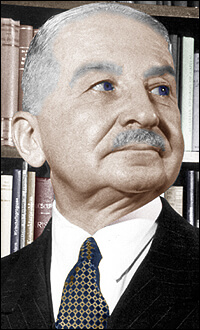
I am currently reading Human Action for the first time, so I will pose a question here for anyone more familiar with Mises’ theory of the trade cycle than I am: Would Mises view the US government’s deficit spending as mitigating the harmful effects of quantitative easing?
Mises repeatedly emphasizes that his theory describes the sequence of events that follow from an injection of money (in the broader sense) into the economy through the loan market. If this new money enters the market in such a way as to affect commodity prices and wage rates before entering the loan market then, according to Mises, it would not generate a boom and subsequent bust. I will quote him at length (pp. 568 of the Scholar’s Edition, available here):
The Difference Between Credit Expansion and Simple Inflation
In dealing with the consequences of credit expansion we assumed that the total amount of additional fiduciary media enters the market system via the loan market as advances to business. All that has been predicated with regard to the effects of credit expansion refers to this condition.
There are, however, instances in which the legal and technical methods of credit expansion are used for a procedure catallactically utterly different from genuine credit expansion. Political and institutional convenience sometimes makes it expedient for a government to take advantage of the facilities of banking as a substitute for issuing government fiat money. The treasury borrows from the bank, and the bank provides the funds needed by issuing additional banknotes or crediting the government on a deposit account. Legally the bank becomes the treasury’s creditor. In fact the whole transaction amounts to fiat money inflation. The additional fiduciary media enter the market by way of the treasury as payment for various items of government expenditure. It is this additional government demand that incites business to expand its activities. The issuance of these newly created fiat money sums does not directly interfere with the gross market rate of interest, whatever the rate of interest may be which the government pays to the bank. They affect the loan market and the gross market rate of interest, apart from the emergence of a positive price premium, only if a part of them reaches the loan market at a time at which their effects upon commodity prices and wage rates have not yet been consummated…
It is important to pay heed to these facts in order not to confuse the consequences of credit expansion proper and those of government-made fiat money inflation. [emphasis added]
Many of the assets added to the Fed’s balance sheet in the past five years have been US government bonds. The Fed is effectively funding the US federal government by printing money. This new money enters the economy not through the loan market but through government demand for goods and services. If I am reading Mises correctly, we should not worry about these fiat dollars on the basis of the Austrian theory of the trade cycle. To be sure, they represent a transfer of wealth from the holders of US dollars to the US government, but they don’t distort the loan market in such a way as to create an unsustainable boom since they act first on the prices of the goods and services bought by the government before they enter the loan market.
To put it another way, government borrowing crowds out private borrowing and investment by businesses. Since these private investments would likely have been malinvestments due to the Fed’s distortion of the loan market, we might prefer these investments to be crowded out rather than made.
Mises would certainly have preferred that the Fed not respond to the 2008 crash by running the printing presses at full tilt. However, given that the Fed has undertaken such a policy, Mises might have preferred that these funds be lent to government rather than entering circulation through the loan market.
[Update: This analysis presumes that the fiscal stimulus comes in the form of government consumption (e.g. highways, bridges, food stamps) and not in the form of subsidized loans to businesses.]
The post Would Mises have Supported Fiscal Stimulus? appeared first on The Economics Detective.
